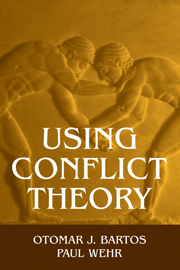Book contents
- Frontmatter
- Contents
- List of Figures and Tables
- Acknowledgments
- 1 Introduction
- 2 Understanding Conflict
- 3 Development of Incompatible Goals
- 4 Application to the Civil Rights Struggle
- 5 Emergence of Overt Conflicts
- 6 Application to a University Conflict
- 7 Escalation and Deescalation
- 8 Application to Conflict in Bosnia
- 9 Making Conflict Work Economically
- 10 Understanding and Managing Conflicts
- Appendix: Prelude to the Dissolution of Yugoslavia
- Notes
- References
- Index
1 - Introduction
Published online by Cambridge University Press: 05 June 2012
- Frontmatter
- Contents
- List of Figures and Tables
- Acknowledgments
- 1 Introduction
- 2 Understanding Conflict
- 3 Development of Incompatible Goals
- 4 Application to the Civil Rights Struggle
- 5 Emergence of Overt Conflicts
- 6 Application to a University Conflict
- 7 Escalation and Deescalation
- 8 Application to Conflict in Bosnia
- 9 Making Conflict Work Economically
- 10 Understanding and Managing Conflicts
- Appendix: Prelude to the Dissolution of Yugoslavia
- Notes
- References
- Index
Summary
in the twentieth century, knowledge about social conflict has increased considerably, but so has the technology and scope of violence. As the new millennium begins, conflict actors must learn not only how to deescalate destructive conflicts, but also how to utilize “constructive” conflicts: how to clarify their own goals; how to select conflict strategies and tactics rationally; and how to apply them to achieve their goals while minimizing the costs.
The Development of Conflict Knowledge
Homo sapiens has been learning about conflict throughout its development. That knowledge is spread across humanity, residing wherever humans live, work, and play. It is folk knowledge, used continuously in everyday life – in commerce, family relations, government, sport, child rearing. The ways of dealing with human conflict around the world are legion. They are passed down from parent to child, from generation to generation. They are transmitted from one life experience to the next. That knowledge is created within generations, as humans learn better how to interact with minimal cost. We do this pretty much unconsciously. Handling conflict is simply one of the life skills we learn and practice. Some of us do it better than others.
Particularly in the twentieth century we have become more conscious of how to understand conflict and how to deal with it in constructive ways. Conducted in numerous abstract and formal ways – through writing and teaching in schools and universities, and through research programs, seminars, and training – this effort was not simply due to curiosity but was a search for a solution to an increasingly serious problem, the growing scale and cost of human conflict.
- Type
- Chapter
- Information
- Using Conflict Theory , pp. 1 - 11Publisher: Cambridge University PressPrint publication year: 2002



